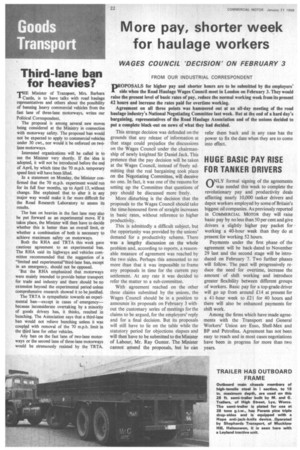More pay, shorter week for haulage workers
Page 24

If you've noticed an error in this article please click here to report it so we can fix it.
WAGES COUNCIL 'DECISION' ON FEBRUARY 3
FROM OUR INDUSTRIAL CORRESPONDENT
WOPOSALS for higher pay and shorter hours are to be submitted by the employers' Iside when the Road Haulage Wages Council meet in London on February 3. They would raise the present level of basic rates of pay, reduce the normal working week from its present 42 hours and increase the rates paid for overtime working.
Agreement on all three points was hammered out at an all-day meeting of the road haulage industry's National Negotiating Committee last week. But at the end of a hard day's bargaining, representatives of the Road Haulage Association and of the unions decided to put a complete black-out on news of what they had decided.
This strange decision was defended on the grounds that any release of information at that stage could prejudice the discussions on the Wages Council under the chairmanship of newly knighted Sir Daniel Jack. This pretence that the pay decision will be taken at the Wages Council, instead of freely admitting that the real bargaining took place on the Negotiating Committee, will deceive no one. In fact, it was one of the reasons for setting up the Committee that questions of pay should be discussed more freely.
More disturbing is the decision that the proposals to the Wages Council should take the time-honoured form of straight increases in basic rates, without reference to higher productivity.
This is admittedly a difficult subject, but the opportunity was provided by the unions' demand for a productivity scheme. There was a lengthy discussion on the whole problem and, according to reports, a reasonable measure of agreement was reached by the two sides. Perhaps this amounted to no more than that it was impossible to frame any proposals in time for the current pay settlement. At any rate it was decided to refer the matter to a sub-committee.
With agreement reached on the other three claims submitted by the unions, the Wages Council should be in a position to announce its proposals on February 3 without the customary series of meetings for the claims to be argued, for the employers' reply and for a final decision. But its proposals will still have to lie on the table while the statutory period for objections elapses and will then'have to be submitted to the Minister of Labour, Mr. Ray Gunter. The Minister cannot amend the proposals, but he can refer them back and in any case has the Power to fix the date when they are to come into effect.




















































































































